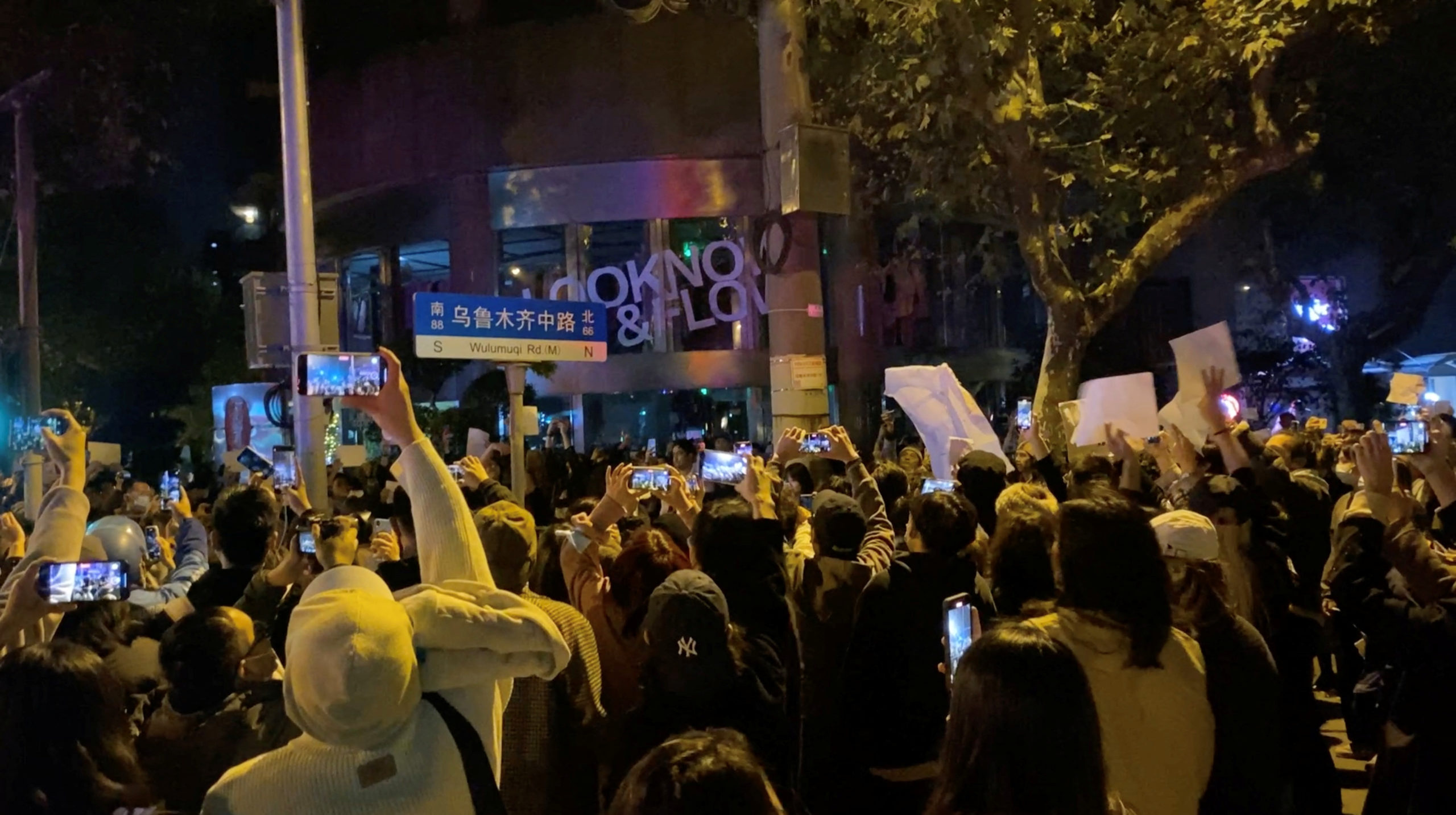Anti-lockdown and anti-government protests all over China after deadly Xinjiang fire
Protests against COVID restrictions have broken out in major cities all over China.

Protests took place all over China, including Beijing, Shanghai, Nanjing, and Urumqi — provincial capital of the Xinjiang region — on Saturday and Sunday as crowds demonstrated against ongoing COVID-19 lockdowns.
The protests came after a fire in Xinjiang’s capital city Urumqi resulted in the death of 10 residents and the injury of nine more, leading many in China to question whether lockdown measures such as sealed doors may have prevented the victims from escaping the building. Video footage circulating on Chinese social media showed crowds in Urumqi singing the lyrics to China’s national anthem, including the line “Rise up! Those who refuse to be slaves!” Two days earlier, security officers in hazmat suits violently attacked protesting workers at Foxconn’s iPhone factory in Zhengzhou, Henan Province
Protesters also took to the streets in Shanghai on Saturday night, where crowds on Urumqi yelled slogans. Video on Twitter showed demonstrators yelling “down with the CCP, down with Xí Jìnpíng 习近平.”
上海乌鲁木齐路 最新视频
民众齐声高喊“共产党下台 习近平下台”
马路对面的警察并未阻止 pic.twitter.com/Vh40idZWWy— 李老师不是你老师 (@whyyoutouzhele) November 26, 2022
Students at the Communication University of China in Nanjing gathered to protest, and protesters in various parts of Beijing marched peacefully, calling for a lifting of restrictions. Videos on Twitter showed Beijing residents removing barricades and arguing with officials over lockdown measures:
北京天通苑北一区
居民撕破隔离铁皮,走上街头 pic.twitter.com/McL6DCMMVq— 李老师不是你老师 (@whyyoutouzhele) November 26, 2022
Anti-lockdown protests also broke out in #Beijing ( Tuofangying area) #CCPChina tonight. #ZeroCovid #Covid #Covid19 pic.twitter.com/OM1c0jgre5
— Inconvenient Truths by Jennifer Zeng 曾錚真言 (@jenniferzeng97) November 26, 2022
Posts on the protests spread rapidly on Chinese social media platforms Weibo and WeChat, but Chinese censors quickly moved to block such commentary, leading some Chinese netizens to create viral posts simply writing one word, such as “yes” (对) or “support” (支持) over and over again. The posts satirize Chinese censors who allow positive words over the “Great Firewall” but censor negative commentary.
China is the only major country continuing to pursue a strict COVID-zero approach to the virus, and after nearly three years of restrictions citizens are beginning to wonder when society will open up.
Long-simmering frustrations
Anger over the deadly fire has built on long-simmering frustration over pandemic restrictions; Xinjiang has been under strict lockdown measures for over 100 days. In response to the extraordinary protests, authorities announced they would open up several neighborhoods in the region’s capital.
Large-scale protests in China but especially in Xinjiang are rare, given the extensive blanket of high-tech surveillance measures authorities have imposed on the region as part of efforts to quell what the government sees as separatist or extremist tendencies.
This weekend’s protests came on the heels of unrest in other parts of the country as patience over restrictions on movement and frequent required PCR testing wears thin among China’s population. Workers at a Foxconn factory in Henan province clashed with security personnel earlier this week after their employer delayed payments, adding to frustration over lockdowns. Earlier this month residents of Guangzhou protested strict lockdowns, in some cases violently confronting police forces on the city’s streets.
Despite some signals from Beijing this month that it would move to ease China’s pandemic restrictions, recent record surges of cases have forced large swathes of the country back into strict lockdowns, testing the patience of the country’s populace.
What’s next?
It’s possible that the government will find a way to stop the protests and intimidate or placate the people demonstrating. But the situation is extremely unpredictable. The writer and teacher David Moser, a long-time resident of Beijing, tweeted:
I’ve lived in China for 30 years, and I’ve never seen such a brazenly open and sustained expression of rage against the PRC govt. WeChat is exploding with protest videos and furious vitriol, and civil disobedience is becoming rampant. This is a serious test of CCP governance.






